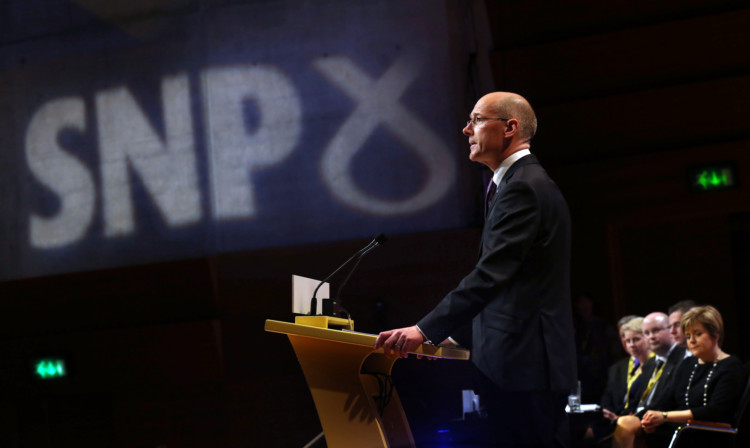Scotland will be “saddled with UK debt” for years if voters reject independence, the Finance Secretary has warned.
The Scottish economy already outperforms that of the UK as a whole, and would do even better if the country became independent, John Swinney said.
The consequences of a No vote in next September’s referendum will be costly, he told the SNP annual conference in Perth.
“If Scotland votes No, we will be saddled with UK debt for many, many years to come,” he said.
Mr Swinney hit out at the “reckless deficits Westminster has built up”, saying that “every person in Scotland is paying the bill, paying the price, for Westminster’s mismanagement”.
He attacked the UK Government for “five years of austerity, with another five years of austerity to come” and said Chancellor George Osborne has failed to solve the country’s economic problems.
“The UK hasn’t paid down the deficit and household incomes have fallen. The UK deficit is now £121 billion,” he said.
The “economic performance of Scotland is better than the UK” with a higher employment rate and lower unemployment rate, he said as he highlighted recent GDP figures which show that growth in Scotland “outstripped” that of the UK, at 1.8% compared with 1.3%.
“That is what we are able to do with devolution,” Mr Swinney said.
“We could do so much more with independence.
“The debate over Scotland’s wealth has been won. Scotland can afford to be independent. The facts and figures are clear and they are indisputable. Scotland is in a stronger financial position than the UK.”
As well as attacking the coalition’s handling of the economy, he described UK Government welfare reforms as “punishment for the vulnerable”.
The Scottish Government has provided £20 million to help mitigate the effects of housing benefit cuts, known as the “bedroom tax”.
Cash from the Scottish Government and local councils has been used to prevent half-a-million people from suffering a 10% cut in council tax benefit, he said.
“We go the extra mile to pick up the pieces from bad Westminster decisions,” Mr Swinney told the conference.
“Never has that been more the case than on the welfare reform programme.”
He said “those who can work should work” but “let me also be clear that in an independent Scotland we will help our young people into work not humiliate them, and we will support our vulnerable people into work not vilify them into work”.
Opponents of independence “like to claim” that if the country left the UK, its economy would be based on oil, but Scotland’s strength is also in its people, he said.
“The basis of our economy is our skills. The basis of our economy is, and ever will be, founded on the creativity, the intelligence and the boundless talents of the people of Scotland. That is the basis to our economy. Scotland has all that it takes to be an independent country.”
